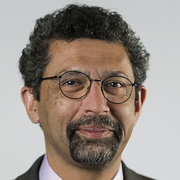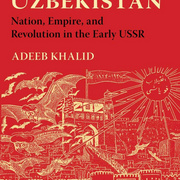Carleton College professor of history Adeeb Khalid will celebrate the publication of his new book, “Making Uzbekistan: Nation, Empire, and Revolution in the Early USSR” with a public presentation and reception on Wednesday, Feb. 3 from 4:30 to 5:30 p.m. in the Gould Library Athenaeum. Along with guest commentators, Khalid will talk about the key findings in his study, and share insights into his process of archival research and analysis. This event is free and open to the public.
“Making Uzbekistan: Nation, Empire, and Revolution in the Early USSR” (Cornell University Press, 2016) chronicles the tumultuous history of Central Asia in the age of the Russian revolution. Traumatic upheavals—war, economic collapse, famine—transformed local society and brought new groups to positions of power and authority in Central Asia, just as the new revolutionary state began to create new institutions that redefined the nature of power in the region. This was also a time of hope and ambition in which local actors seized upon the opportunity presented by the revolution to reshape their society. As the intertwined passions of nation and revolution reconfigured the imaginations of Central Asia's intellectuals, the region was remade into national republics, of which Uzbekistan was of central importance.
Making use of archival sources from Uzbekistan and Russia as well as the Uzbek- and Tajik-language press and belles letters of the period, Khalid provides the first coherent account of the political history of the 1920s in Uzbekistan. He explores the complex interaction between Uzbek intellectuals, local Bolsheviks, and Moscow to sketch out the flux of the situation in early-Soviet Central Asia. His focus on the Uzbek intelligentsia allows him to recast our understanding of Soviet nationalities policies. Uzbekistan, he argues, was not a creation of Soviet policies, but a project of the Muslim intelligentsia that emerged in the Soviet context through the interstices of the complex politics of the period. The energies unleashed by the revolution also made possible the golden age of modern culture, as authors experimented with new literary forms and the modern Uzbek language took shape. “Making Uzbekistan” introduces key texts from this period and argues that what the decade witnessed was nothing short of a cultural revolution.
This event is sponsored by the Carleton College Department of History. For more information, including disability accommodations, call (507) 222-4217. The Gould Library is located off College Street on the Carleton campus and is also accessible via Highway 19 in Northfield.




